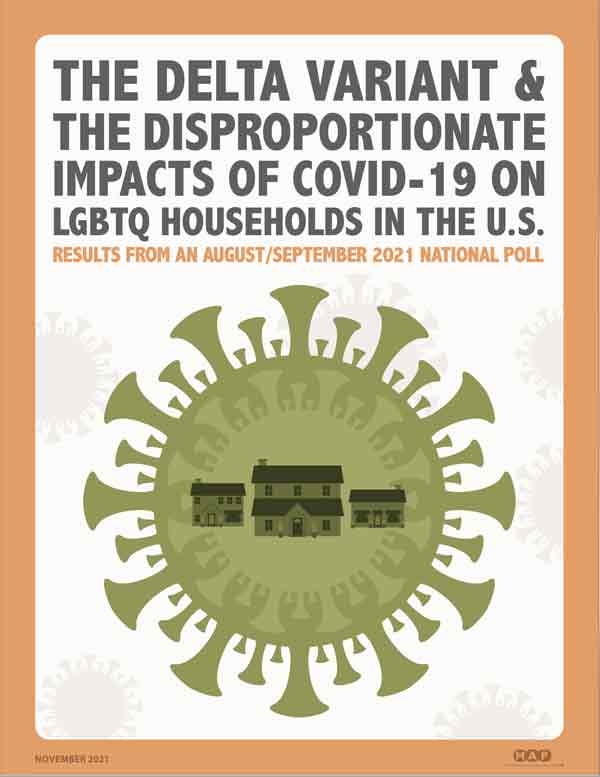The Delta Variant & the Disproportionate Impacts of COVID-19 on LGBTQ Households in the U.S. (PDF)Download
Related Report: The Disproportionate Impacts of COVID-19 on LGBTQ Households in the U.S. (December 2020)Visit Issue Page: COVID-19Visit
In December 2020, MAP released an analysis of a nationally representative survey conducted by NPR, The Robert Wood Johnson Foundation, and the Harvard T.H. Chan School of Public Health (NPR/RWJF/ Harvard) showing how LGBTQ people, particularly LGBTQ people of color and those raising children, experienced higher rates of economic insecurity, had difficulty accessing needed medical care, and struggled with work and education during the first summer of the pandemic.
NPR/RWJF/Harvard conducted a follow-up survey focused on the Delta variant and its continued impact on households in the United States. MAP's report, The Delta Variant & the Disproportionate Impacts of COVID-19 on LGBTQ Households in the U.S., summarizes the key findings about the experiences of LGBTQ people and their households and offers comparisons to the non-LGBTQ respondents in this broader national poll.
The report finds that the the Delta variant and the ongoing uncertainty related to the pandemic continue to result in disproportionate impacts on LGBTQ people and their families. This includes significant economic challenges, health challenges from the pandemic and struggling to manage work and childcare responsibilities—all at higher rates than for non-LGBTQ people.
Although the 2021 survey's LGBTQ sample size was too small to allow for meaningful analysis of racial or other differences within the LGBTQ community, it is important to note that the 2020 survey clearly showed that LGBTQ households of color faced even higher rates of financial problems, employment or wage loss, and obstacles to accessing needed health care. As the pandemic approaches the end of its second year and the Delta variant continues to exacerbate already existing disparities, we should expect these same disproportionate impacts to continue, if not worsen.
Recommended citation: Movement Advancement Project. November 2021.
The Delta Variant & the Disproportionate Impacts of COVID-19 on LGBTQ Households in the U.S.
www.mapresearch.org/2021-covid-lgbtq-households.
About the poll:From Harvard: "Interviews were conducted online and via telephone (cell phone and landline), August 2-September 7, 2021, among a nationally representative, probability-based sample of 3,616 adults age 18 or older in the United States. Data collection was conducted in English, Spanish, Mandarin, Cantonese, Korean, and Vietnamese by SSRS (Glen Mills, PA), an independent research company. The margin of sampling error, including the design effect, was ±3.4 percentage points at the 95% confidence level for national data." Among the total sample of 3,616 adults, 393 identified as LGBTQ. Further methodological information is available at the end of each of Harvard's reports in
the series.


